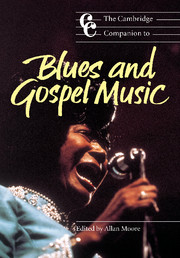Book contents
- Frontmatter
- 1 Surveying the field: our knowledge of blues and gospel music
- 2 Labels: identifying categories of blues and gospel
- 3 The development of the blues
- 4 The development of gospel music
- 5 Twelve key recordings
- 6 “Black twice”: performance conditions for blues and gospel artists
- 7 Vocal expression in the blues and gospel
- 8 The Guitar
- 9 Keyboard techniques
- 10 Imagery in the lyrics: an initial approach
- 11 Appropriations of blues and gospel in popular music
- Notes
- Bibliography
- Selected discography and videography
- Index
- Plate section
11 - Appropriations of blues and gospel in popular music
Published online by Cambridge University Press: 28 September 2011
- Frontmatter
- 1 Surveying the field: our knowledge of blues and gospel music
- 2 Labels: identifying categories of blues and gospel
- 3 The development of the blues
- 4 The development of gospel music
- 5 Twelve key recordings
- 6 “Black twice”: performance conditions for blues and gospel artists
- 7 Vocal expression in the blues and gospel
- 8 The Guitar
- 9 Keyboard techniques
- 10 Imagery in the lyrics: an initial approach
- 11 Appropriations of blues and gospel in popular music
- Notes
- Bibliography
- Selected discography and videography
- Index
- Plate section
Summary
Appropriations of blues and gospel – taking musical and textual elements and recombining them in new contexts – is a topic bound up with issues of race, identity, culture, and social and economic class, as well as music history and theory. Viewed benignly, such appropriations are part of the inevitable evolution of musical styles and cultural values, both within societies and between classes and races. In a broader view, however, they are emblematic of the exploitation found throughout history in encounters between groups of peoples. In the United States, black musical expressions in blues and gospel have been appropriated by the recording industry for the mass white audience throughout the twentieth century, in a tension between music as identity and culture and music as mass-marketed, profitable diversion. Of the many aspects to the role of blues and gospel in U.S. society, I am concerned here with their contexts within the legacy of slavery, and the appropriation of musical elements by other genres. How do blues and gospel songs give rise to styles – rhythm and blues, rock'n'roll, doo-wop, rock, heavy metal, soul, funk, disco, rap, ska, reggae, pop-gospel, contemporary Christian, and others – which continue to dominate all forms of media today?
Categorization, crossover, fusion
Writing about music involves categorization to facilitate comparisons of styles, but unless we discover a musical area equivalent to the Galapagos Islands, we inevitably find that musical styles result from many influences which defy clear boundaries. The terms “crossover” and “fusion,” while useful, rely on such categorization and thus need qualification. The roles of Chuck Berry and Elvis Presley in the rise of rock’n’roll (r&r) in the 1950s are often cited in relation to appropriation, crossover, and fusion, and will serve as examples.
- Type
- Chapter
- Information
- The Cambridge Companion to Blues and Gospel Music , pp. 158 - 187Publisher: Cambridge University PressPrint publication year: 2003



